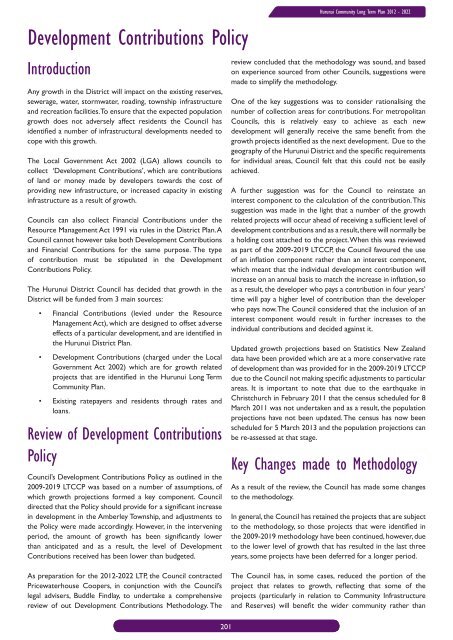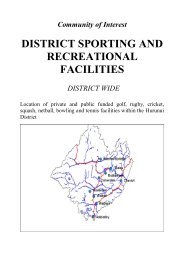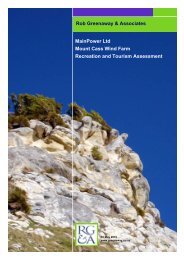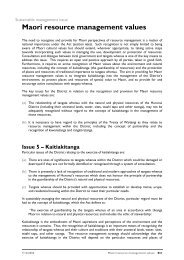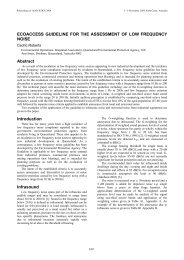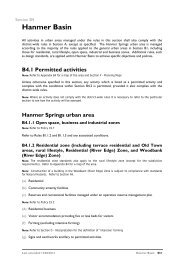Long Term Community Plan 2012-2022 - Hurunui District Council
Long Term Community Plan 2012-2022 - Hurunui District Council
Long Term Community Plan 2012-2022 - Hurunui District Council
You also want an ePaper? Increase the reach of your titles
YUMPU automatically turns print PDFs into web optimized ePapers that Google loves.
Development Contributions Policy<br />
Introduction<br />
Any growth in the <strong>District</strong> will impact on the existing reserves,<br />
sewerage, water, stormwater, roading, township infrastructure<br />
and recreation facilities. To ensure that the expected population<br />
growth does not adversely affect residents the <strong>Council</strong> has<br />
identified a number of infrastructural developments needed to<br />
cope with this growth.<br />
The Local Government Act 2002 (LGA) allows councils to<br />
collect ‘Development Contributions’, which are contributions<br />
of land or money made by developers towards the cost of<br />
providing new infrastructure, or increased capacity in existing<br />
infrastructure as a result of growth.<br />
<strong>Council</strong>s can also collect Financial Contributions under the<br />
Resource Management Act 1991 via rules in the <strong>District</strong> <strong>Plan</strong>. A<br />
<strong>Council</strong> cannot however take both Development Contributions<br />
and Financial Contributions for the same purpose. The type<br />
of contribution must be stipulated in the Development<br />
Contributions Policy.<br />
The <strong>Hurunui</strong> <strong>District</strong> <strong>Council</strong> has decided that growth in the<br />
<strong>District</strong> will be funded from 3 main sources:<br />
• Financial Contributions (levied under the Resource<br />
Management Act), which are designed to offset adverse<br />
effects of a particular development, and are identified in<br />
the <strong>Hurunui</strong> <strong>District</strong> <strong>Plan</strong>.<br />
• Development Contributions (charged under the Local<br />
Government Act 2002) which are for growth related<br />
projects that are identified in the <strong>Hurunui</strong> <strong>Long</strong> <strong>Term</strong><br />
<strong>Community</strong> <strong>Plan</strong>.<br />
• Existing ratepayers and residents through rates and<br />
loans.<br />
Review of Development Contributions<br />
Policy<br />
<strong>Council</strong>’s Development Contributions Policy as outlined in the<br />
2009-2019 LTCCP was based on a number of assumptions, of<br />
which growth projections formed a key component. <strong>Council</strong><br />
directed that the Policy should provide for a significant increase<br />
in development in the Amberley Township, and adjustments to<br />
the Policy were made accordingly. However, in the intervening<br />
period, the amount of growth has been significantly lower<br />
than anticipated and as a result, the level of Development<br />
Contributions received has been lower than budgeted.<br />
<strong>Hurunui</strong> <strong>Community</strong> <strong>Long</strong> <strong>Term</strong> <strong>Plan</strong> <strong>2012</strong> - <strong>2022</strong><br />
review concluded that the methodology was sound, and based<br />
on experience sourced from other <strong>Council</strong>s, suggestions were<br />
made to simplify the methodology.<br />
One of the key suggestions was to consider rationalising the<br />
number of collection areas for contributions. For metropolitan<br />
<strong>Council</strong>s, this is relatively easy to achieve as each new<br />
development will generally receive the same benefit from the<br />
growth projects identified as the next development. Due to the<br />
geography of the <strong>Hurunui</strong> <strong>District</strong> and the specific requirements<br />
for individual areas, <strong>Council</strong> felt that this could not be easily<br />
achieved.<br />
A further suggestion was for the <strong>Council</strong> to reinstate an<br />
interest component to the calculation of the contribution. This<br />
suggestion was made in the light that a number of the growth<br />
related projects will occur ahead of receiving a sufficient level of<br />
development contributions and as a result, there will normally be<br />
a holding cost attached to the project. When this was reviewed<br />
as part of the 2009-2019 LTCCP, the <strong>Council</strong> favoured the use<br />
of an inflation component rather than an interest component,<br />
which meant that the individual development contribution will<br />
increase on an annual basis to match the increase in inflation, so<br />
as a result, the developer who pays a contribution in four years’<br />
time will pay a higher level of contribution than the developer<br />
who pays now. The <strong>Council</strong> considered that the inclusion of an<br />
interest component would result in further increases to the<br />
individual contributions and decided against it.<br />
Updated growth projections based on Statistics New Zealand<br />
data have been provided which are at a more conservative rate<br />
of development than was provided for in the 2009-2019 LTCCP<br />
due to the <strong>Council</strong> not making specific adjustments to particular<br />
areas. It is important to note that due to the earthquake in<br />
Christchurch in February 2011 that the census scheduled for 8<br />
March 2011 was not undertaken and as a result, the population<br />
projections have not been updated. The census has now been<br />
scheduled for 5 March 2013 and the population projections can<br />
be re-assessed at that stage.<br />
Key Changes made to Methodology<br />
As a result of the review, the <strong>Council</strong> has made some changes<br />
to the methodology.<br />
In general, the <strong>Council</strong> has retained the projects that are subject<br />
to the methodology, so those projects that were identified in<br />
the 2009-2019 methodology have been continued, however, due<br />
to the lower level of growth that has resulted in the last three<br />
years, some projects have been deferred for a longer period.<br />
As preparation for the <strong>2012</strong>-<strong>2022</strong> LTP, the <strong>Council</strong> contracted<br />
Pricewaterhouse Coopers, in conjunction with the <strong>Council</strong>’s<br />
legal advisers, Buddle Findlay, to undertake a comprehensive<br />
review of out Development Contributions Methodology. The<br />
The <strong>Council</strong> has, in some cases, reduced the portion of the<br />
project that relates to growth, reflecting that some of the<br />
projects (particularly in relation to <strong>Community</strong> Infrastructure<br />
and Reserves) will benefit the wider community rather than<br />
201


